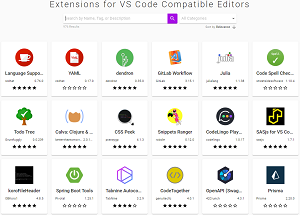News
Eclipse Foundation Takes Over Visual Studio Marketplace Alternative
The Eclipse Foundation has taken over the Open VSX Registry, described as a vendor-neutral alternative to Microsoft's Visual Studio Marketplace site that includes thousands of extensions for the company's open source, cross-platform Visual Studio Code editor.
Open VSX is being handed over by TypeFox, the founder of Theia, an extensible platform to develop multi-language cloud and desktop IDEs with web technologies. Theia in turn powers Gitpod, also founded by TypeFox, which is described as an open source platform for automated and ready-to-code development environments that blends into existing workflows. The Eclipse Foundation one year ago unveiled Eclipse Theia 1.0, described as a "true open source" alternative to VS Code.
The Eclipse Foundation and TypeFox take exception to the above description (commonly used for brevity) of VS Code as being open source, pointing to Microsoft's own documentation that says it's more correct to call VS Code "built on open source."
"While large parts of VS Code are developed as open-source, the actual product (Visual Studio Code) is not open-source," a post on the Gitpod site stated on April 9, 2020, in announcing Open VSX.
The post said Open VSX is developed and maintained under the Eclipse Open VSX project, so it's unclear why it was announced today, almost a year later, that "TypeFox has transitioned the Open VSX Registry to the foundation."
 [Click on image for larger view.] Extensions for VS Code Compatible Editors (source: Open VSX Registry).
[Click on image for larger view.] Extensions for VS Code Compatible Editors (source: Open VSX Registry).
At any rate, it contains the registry server, a web interface and a CLI for easy publishing, along with a singular API as an alternative to Microsoft's VS Code Marketplace API, described as proprietary and undocumented.
The Eclipse Foundation said in a March 30 post that Open VSX provides an level playing field for all, with benefits including:
- No single company or vendor owns the Open VSX Registry servers, operates the service, or has more control over the service than any other participant.
- Any individual or organization can influence how the Open VSX Registry evolves by participating in design discussions and contributing code to the Eclipse Open VSX project.
- There's a public record of all extension ownership claims by extension publishers to avoid conflicts over ownership.
Further information on the project is available in a whitepaper available for download upon providing registration info.
About the Author
David Ramel is an editor and writer at Converge 360.